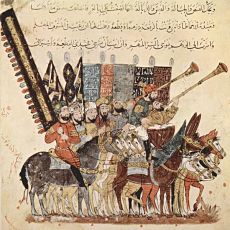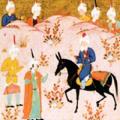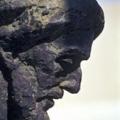154 - The Philosophy of History: Ibn Khaldūn
The historian Ibn Khaldūn applies the methods of philosophy to understand the rise and fall of political regimes.
Themes:
• F. Rosenthal (trans.), Ibn Khaldun: The Muqaddima, 3 vols (Princeton: 1958).
---
• T. Albertini (ed.), The Actuality of North African Philosopher Ibn Khaldūn, special issue of Philosophy East & West, issue 69 (2019).
• A. al-Azmeh, Ibn Khaldūn: an Essay in Reinterpretation (London: 1982).
• A.F. Alatas, Ibn Khaldūn (New Delhi: 2013).
• A.J. Fromherz, Ibn Khaldūn: Life and Times (Edinburgh: 2010).
• B. Lawrence (ed.), Ibn Khaldūn and Islamic Ideology (Leiden: 1984).
• M. Mahdi, Ibn Khaldūn’s Philosophy of History: a Study in the Philosophic Foundation of the Science of Culture (London: 1957).#
• F. Rosenthal, A History of Muslim Historiography (Leiden: 1968).

Andalusia


 ..
..



Comments
podcast
Hi,
For the past few weeks I am having difficulty getting the player to work. It takes a few minutes to start. Does anyone else have this problem?
In reply to podcast by Declan Foley
Player
Hi -
It works ok for me so unless someone else is having trouble maybe it is your connection?
Thanks,
Peter
In reply to podcast by Declan Foley
download!
Playback is always better with local/downloaded files.
Nomadic-sedentary cycle.
Is there a name for Ibn Khaldun's theory of nomadic-sedentary cycle? I feel "asabiyya" doesn't quite catch it because it refers to the "solidarity" within the conquering group, not to the cycle itself.
Also, I guess this cycle stopped at some point in history? I mean, recent superpowers such as the Spanish empire, British empire, Soviet Union, United States, etc. did not originate as nomadic tribe with strong cohesion as Ibn Khaldun says. And they all (except the US) collapsed not due to nomadic invasion, but rather they were replaced by a stronger "sedentary" power. How would a follower of Ibn Khaldun respond to this? Is it fair to say that at some point, technological advantages of being sedentary renders Ibn Khaldun's theory obsolete?
In reply to Nomadic-sedentary cycle. by Hoom
Asabiyya
I don't know that there is a fixed title for the theory as such; you're right that asabiyya is the supposed causal explanation of the cycle, not a name for the cycle as such.
If we give Ibn Khaldun credit for observing a genuine pre-modern phenomenon - and of course it is disputable whether his model applies to all or even most dynastic change up to his own time - then I agree, the emergence of advanced military technology would surely make it harder, or even impossible, for sheer group identity to lead to the toppling of empires. But I think it remains intriguing and even relevant, just think of the many major powers who have trouble keeping separatist areas or populations under control, even with all the modern armaments!
Logic
In the Muqqadmiah, in a chapter called ‘the various kinds of sciences’, Ibn Khaldun outlines the eight canonical works of Aristotelian logic studied by Muslim scholars. He mentions a book called Kitab al-Burhan, translated as Apodeictica, which covers determinatives and definitions. I’m kinda confused as to which book exactly he’s referring to, can anyone help me out? Plus, are there any decent translations of Islamic logical works/abridgements/commentaries?
In reply to Logic by Kay
Burhan
"Burhān" (Demonstration) is Aristotle's Posterior Analytics (the Prior Analytics is Qiyās). The title was also borrowed for works on demonstration by Farabi, Avicenna and others but Ibn Khaldun would, as you say, be referring to Aristotle's logical works.
There is a translation by Majid Fakhry of Farabi's paraphrase of the Posterior Analytics, and Avicenna's Najat and Isharat have had their logical sections translated which would probably be the best things to check out. Have a look at the Stanford Encyclopedia page on logic in Arabic which has extensive bibliography.
Ibn Khaldun
Hello there, I love this website and have my students use it. I was wondering whether you wanted to add a special issue on Ibn Khaldun I guest-edited for Philosophy East & West: Politics, Nature, and Society - The Actuality of North African Philosopher Ibn Khaldūn, ed. by Tamara Albertini, Special Issue, PEW 69, 3 (2019).
For more information, see: https://www.academia.edu/41662403/Guest_Ed._Politics_Nature_and_Society_-_The_Actuality_of_North_African_Philosopher_Ibn_Khald%C5%ABn_Special_Issue_Table_of_Contents_
In reply to Ibn Khaldun by Tamara Albertini
Ibn Khaldun
Oh yes, thanks! I try to update the bibliographies here on the site as new things come out but this had escaped my notice, I will add it.
Comment
Lovely podcast thank you for sharing this knowledge !
Circulation of Elite
Vilfredo Federico Damaso Pareto has postulated the theory of circulation of Elite which is similar to Ibn Khaldun's theory of change of political Regimes. Has there been any link?
In reply to Circulation of Elite by Farooq
Pareto
No, not that I have ever seen. To be honest Pareto is a new name for me in general!
Ernest Gellner
A big fan of Ibn Khaldun was professor Ernest Gellner, who reintroduced his work as a serious sociological theory in 1980s and 1990s.
Add new comment